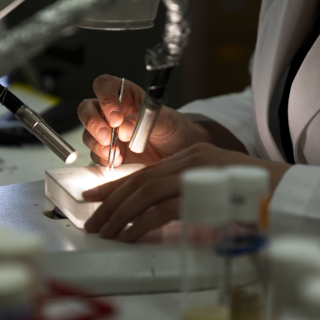Community Engagement
Community Engagement on a National Level
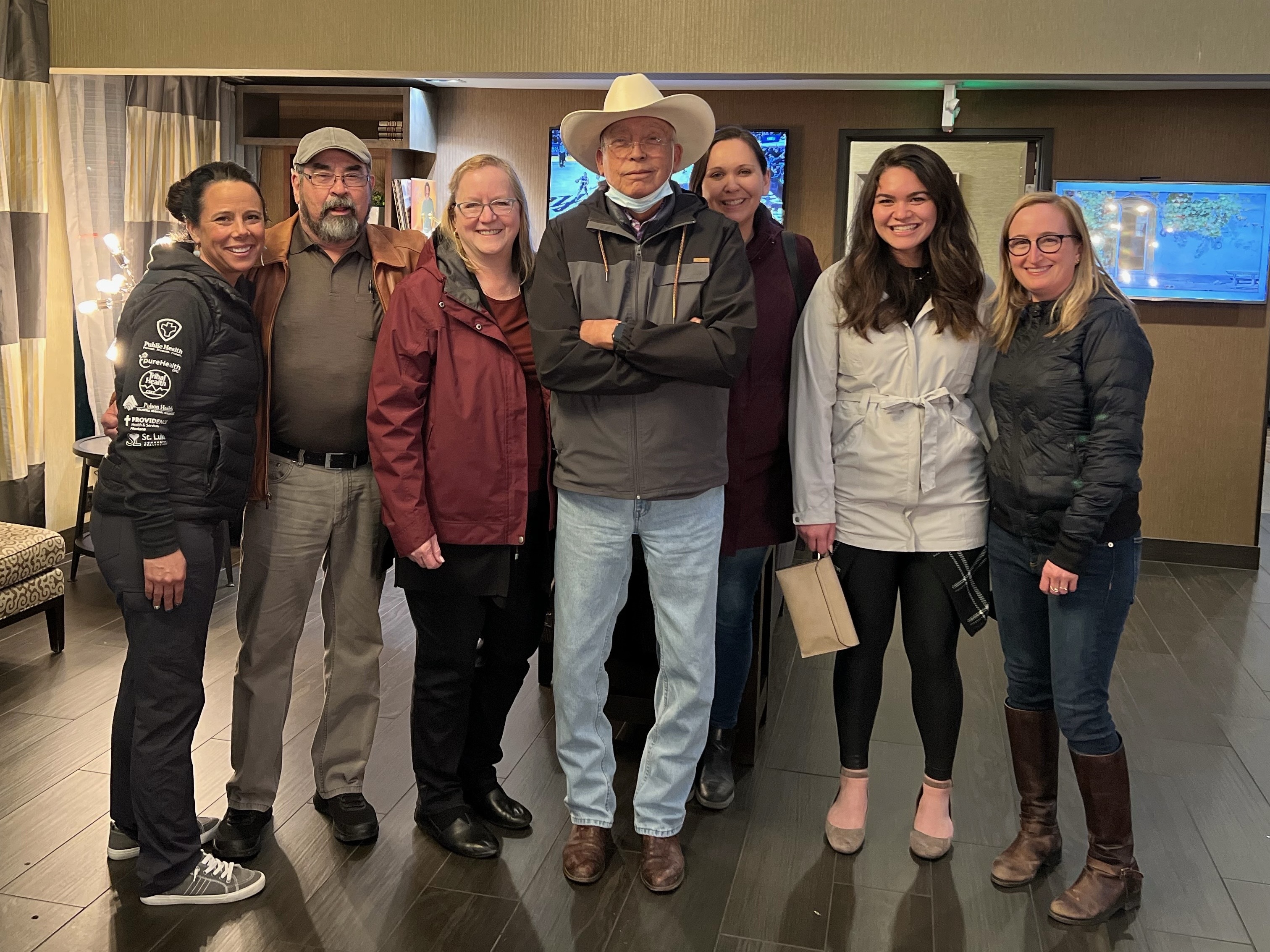
From left to right: Community Pharmacogenetics Advisory Council members Niki Graham, Bernie Azure, Elizabeth Putnam, Lloyd Irvine, Jamie Cahoon, Karen Brown, and Erica Woodahl
Ensuring equitable access to the benefits of precision medicine for American Indian and Alaska Native (AIAN) people requires translational research within these communities. After a legacy of research misconduct, thoughtful community engagement is necessary to ethically inform precision medicine research (PMR) methods and ensure research aims are aligned with community priorities and expectations. In May 2022, we held a 2-day deliberation in Seattle, WA with community members from our Tribal partners in Montana and Alaska and representatives from other Tribal groups, the NIH, and researchers. We discussed principles, issues, and challenges related to PMR in AIAN communities. The deliberation focused on considerations for conducting PMR, including data and biospecimen stewardship, return of research results, and aligning research aims with Tribal health priorities. Attendees emphasized the importance of actions that promote early community consultation and effective capacity development within both research institutions and the community. The event represented a culmination of bidirectional learning opportunities between Tribal communities and partners in the Northwest-Alaska Pharmacogenomics Research Network and provided a platform for groups representing Tribal populations, academia, funding agencies, and industry to share insights on future PMR within AIAN populations.
Maintaining Community Engagement in a Pandemic
Many clinical research projects across the US were put on hold to prevent the spread of COVID-19 from 2020-2022. American Indian and Alaskan Native groups were especially vulnerable to the consequences COVID-19, in part due to the inequities and healthcare disparities experienced by tribal patients. Many tribal groups enacted stricter pandemic protocols than surrounding areas, and this included the CSKT. It was important to CPAC members and researchers in the lab to maintain communication and continue cultivating relationships. The group met regularly via zoom, planning for research recruitment when restrictions were lifted.
From left to right, top to bottom: Patricia Kelly, Erica Woodahl, Lloyd Irvine, Rachel Matt, Wendy Westbroek, Brenda Bodnar, Bernie Azure, LeeAnna Muzquiz, Elizabeth Putnum, Vernon Finley, Steve Lozar, and Jodi Hunter.
Community Advisory Board -- Community Pharmacogenetics Advisory Council (CPAC)
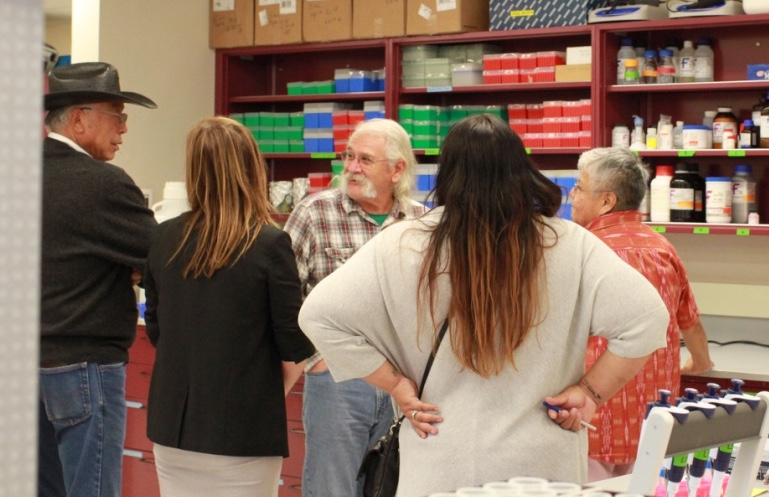
Members of our community advisory board have a few laughs during a tour of the lab
A key part of the success of the precision medicine project is dependent on the feedback and input from CSKT members. Established in 2010, the Community Phramacogenetics Advisory Council (CPAC) is made up of interested CSKT community members who help us, as researchers, to understand how to implement informed and respectful research practices that are in line with the beliefs of the CSKT community. During these community advisory board meetings, we discuss important ethical issues that specifically pertain to genetic research conducted in American Indian and Alaska Native populations. Topics of discussion include prior breaches of trust by other research teams, proper disposal of unused samples in accordance with religious beliefs, and return of research results to the community to name a few.
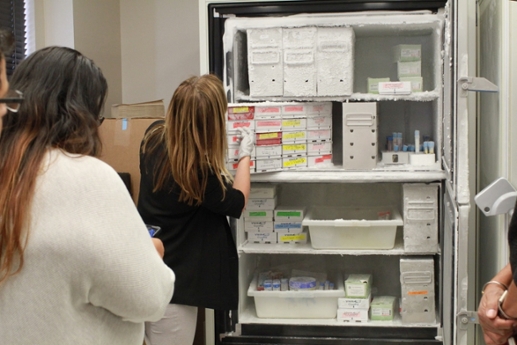
Dr. Woodahl shows how the samples are stored
The CSKT CPAC came down to the University of Montana in Missoula to get a better understanding of what happens to the samples after we collect them from participants. Dr. Woodahl started off with showing the group our 'traveling lab', complete with two small portable freezers for safe sample transport between sites and centrifuge for processing in the field. She then described the process we go through to process the blood after it is drawn from a participant by a phlebotomist. Finally, she showed the group where the samples were stored for the long term. CPAC members asked questions along the way as well as bringing up some interesting cultural anecdotes and a few good jokes here and there.
The current members of the CSKT Community Pharmacogenetics Advisory Council are Bernie Azure, Marissa Basler, Brenda Bodnar, Jamie Cahoon, Vernon Finley, Jodi Hunter, Lloyd Irvine, Patricia Kelly, and Steve Lozar.
Engaging Children
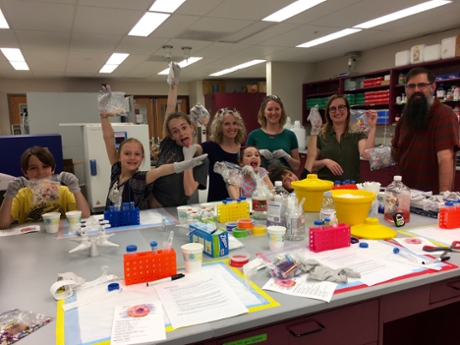
Showing off some wonderful models of single cells
Dr. Woodahl invited a few kids to the lab for some fun activities this past summer. She showed the children and their parents how to make their own models of a single cell using glitter, dish soap and other fun materials. Next she showed the kids how to extract DNA from their own saliva. Each person spat into their individual cup and then followed a scientific protocol to extract the DNA by themselves! Fun was had by all, but most importantly, the children had a positive experience with science, showing them that they are capable of doing something pretty cool, that wasn't too hard, and even a little fun!
